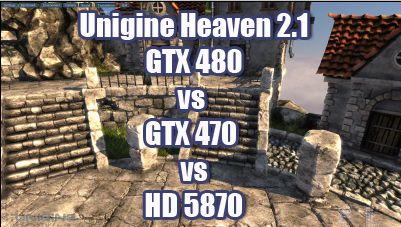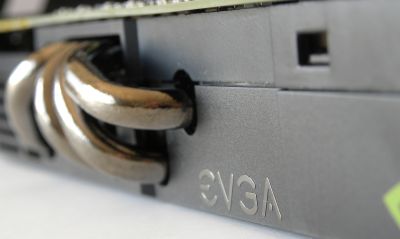
The big feature of Unigine Heaven 2.1 is the hardware tessellation in OpenGL 4.0. So let’s see what are the scores in Extreme tessellation mode in OpenGL 4.0 and Direct3D 11.
I tested the benchmark with an EVGA GTX 480 and a GTX 470 with the latest R257.15 graphics drivers that bring OpenGL 4.0 support (OS= Win7 64-bit). I also added a Radeon HD 5870 in the test but in Direct3D only.
Testbed:
– Intel Core2 Extreme X9650 @ 3GHz
– 4GB DDR3
– Mobo: MSI P45D3 Platinium
– PSU: Antec TruePower Quttro 850W
– Win7 64-bit

EVGA GTX 480 Scores
GTX 480 clocks – GPU:700MHz, memory:1848MHz and shader:1401MHz
OpenGL 4.0
Res: 1920×1080 fullscreen
Tessellation mode: Extreme
– Score: 916
– FPS = 36.4
– Min FPS = 6.1
– Max FPS = 89.4
Direct3D 11
Res: 1920×1080 fullscreen
Tessellation mode: Extreme
– Score: 970
– FPS = 38.5
– Min FPS = 17.6
– Max FPS = 95.5
GeForce GTX 470 Scores
GTX 470 clocks – GPU:607MHz, memory:1674MHz and shader:1215MHz
OpenGL 4.0
Res: 1920×1080 fullscreen
Tessellation mode: Extreme
– Score: 719
– FPS = 28.5
– Min FPS = 5.9
– Max FPS = 70.4
Direct3D 11
Res: 1920×1080 fullscreen
Tessellation mode: Extreme
– Score: 768
– FPS = 30.5
– Min FPS = 13.5
– Max FPS = 76.1
Radeon HD 5870 Scores
– HD 5870 clocks – GPU:850MHz and memory:1200MHz
– Drivers: Catalyst 10.4
OpenGL 4.0
Not supported yet.
Direct3D 11
Res: 1920×1080 fullscreen
Tessellation mode: Extreme
– Score: 531
– FPS = 21.1
– Min FPS = 6.5
– Max FPS = 74.4
According to this quick test, the GTX480 is 30% faster than the GTX 470. The GTX 470 is around 40% faster than the HD 5870… And the GTX480 is 80% faster than the HD5870. Ouch!!!
And the Direct3D11 scores are better than OGL 4 scores
the extreme tessellation in heaven is so killer!
..just look at the wireframe..its just one big point cloud!
@DrBalthar : Yeah, if you care about a 2 fps difference … lol
Nvidia has always been better in support for openGL, have to wait for the 10.5 drivers from ATI, maybe we will see some small improvements.
I really don’t get the hazle about the hardware implementation of tesselation for this demo… why isn’t there tesselation and displacement mapping for opengl 2.0/3.0 using instancing???
Also why the hell is the texture buffer still only 256MB it’s no wonder ATI suck at OpenGL run heaven at 1920×1080 in OpenGL and ATI cards are going to very quickly run out of room for textures. WTF ATI my HD5770 has 1GB of DDR5 Ram fucken use it
I think it is to early to take conclusions on the Tessellation performance of OpenGL 4.0 vs. Direct3D 11.
OpenGL drivers are very recent and even Direct3D 11 drivers are note that old 🙂
When some more games, using these two APIs, come out then were going to have some real test bench!
Extreme Tessellation dosnt need no one…
5870 in normal tess. is more fps when need
and dont forget about crossfire and $
470/480 better in tess. – later buildet, ati doo the same if whos later…
Dont worry. 10.5 are out and you can test it with OGL4 🙂
Any chance to see a quick test with GNU/Linux?, 😉
Pingback: [Test] OpenGL 4.0 and Direct3D 11 Tessellation: GTX 480 vs GTX 470 vs HD 5870 vs HD 5770 - 3D Tech News, Pixel Hacking, Data Visualization and 3D Programming - Geeks3D.com
Pingback: The Hype is real GTX465 unlocked! - Page 11 - Overclock.net - Overclocking.net
80% faster my ass!
System: core i7 950 (3.81Ghz)
2x hd5850 Asus (800-1050)
2x Corsair Performance 64GB RAID0
Score: 1646
Min Fps 26.7
Max Fps 167.2
And i dindn’t even “push” it a little.
Been playing around with me 470 a bit today, I’v had it since almost the release and not bothered playing with the settings.. its nice to see some results that are not i7 🙂
At core clock 766, shader 1532, and default memory 1674 with the same settings (1920×1080, extreme tesselation) got a reasonable score of 888, given me cpu is smelly old core 2 duo e6600 @2.4 w/8gig ddr2 hehe.. saving up for i7 😛
Van— I fail to see you’re point, obviously an i7 with 2 graphics cards is going to get a much better result than core 2 cpu with a single gfx card
Van – next time you should post your resolution because, I mean, it “kind of” matters.
Post the settings used – double LOL @ Van
Intel Core i5-760+NOCTUA NH-U9B SE2 @ 2892 MHz | MSI N470GTX Twin Frozr II @ 700/1400/3600MHz
2x2GB DDR3 Kingston @ 1606MHz 8.0-8-8-24 | ASUS SABERTOOTH 55i | Win XP pro SP3 | ForceWare 260.99
Screenshot of result is here
http://img269.imageshack.us/img269/8862/uniginebenchmark.jpg
and PSU is SEASONIC S12II-620 Bronze
a little tweaked
http://img703.imageshack.us/img703/9768/uniginebenchmark2.jpg
Pingback: [Tested] Catalyst 11.1a Hotfix (Jan26): Gains up to 18% in OpenGL Tessellation (TessMark) - 3D Tech News, Pixel Hacking, Data Visualization and 3D Programming - Geeks3D.com
well so many 3d pipelines for hardware scaling!
scale up to fullscreen using nvcp/desktop size and position
set windows resolution to highest pc resolution possible in windows 1366-768P
then in nvcp go to desktop size and force 480P resolution and use the display auto zoom function to scale the rendered image to full screen.
i see zero difference in the desktop after scaling the image so gpu manipulated the resolution resulting in frame per second boosts of 200% 300%.
crysis 2 likes this setting and you will notice that your pixel engine speed of your display(170hz in my case) will set the max fps
also minimum of 30 better 60 fps is a must for gamers.
it`s also not in the benchmark result what resolution was used and running the benchmark with lower resolution will greatly enhance your benchie score
i had 110.000 in tessmark with i3 and gtx480
beating a i7 with threeway sli gtx480
also using lower resolution will increase level of detail
use a little bit of Antiailiasing for make it look sharp